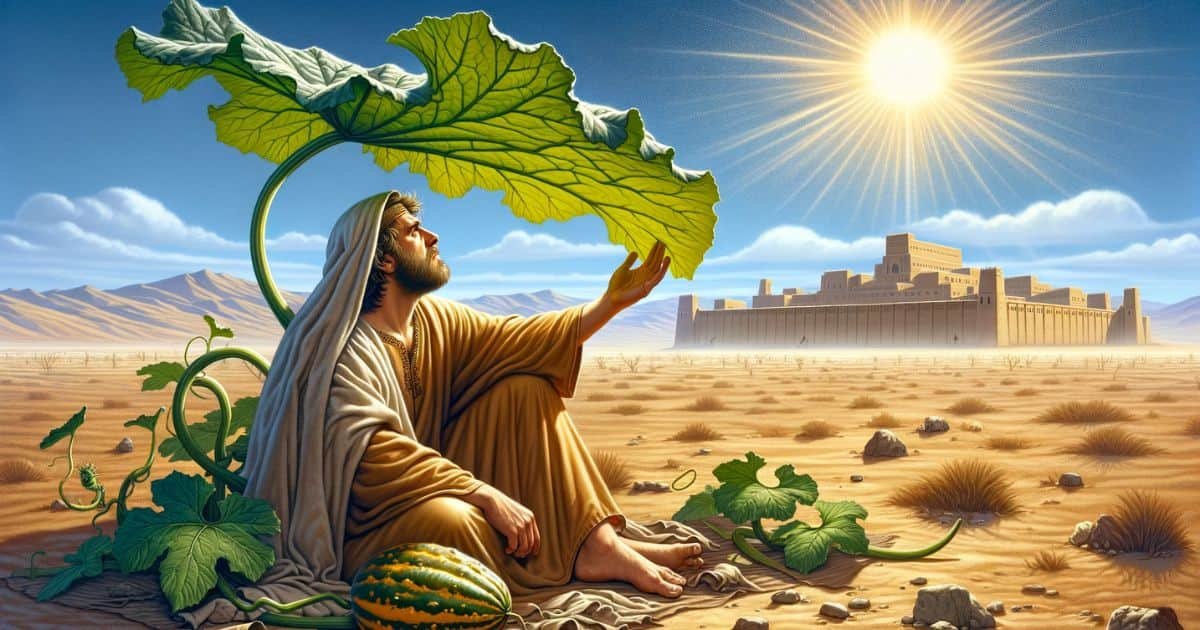The gourd in the Bible primarily symbolizes God’s mercy and protection. It appears in stories of Jonah, Elisha, and in Solomon’s Temple, underscoring God’s compassion and sovereignty.

What is a Gourd?
Gourds are part of the Cucurbitaceae family, which includes squash, cucumbers, and melons. They are known for their fast growth and sprawling vines. In ancient times, gourds were not just food sources but also used as utensils or containers due to their hard shells. Their presence in the Bible signifies their importance in early human civilization. This botanical background sets the stage for understanding their relevance in biblical texts.
Gourd in the Bible
Elisha and the Poisonous Gourd Stew
In the book of 2 Kings, there is a significant account involving the prophet Elisha and a poisonous gourd stew. This event occurs during a time of famine, as Elisha returns to Gilgal, where he is leading a group of prophets.
The Bible recounts that while there, Elisha instructs his servant to prepare a large pot of stew for the prophets. During the preparation, one of the prophets goes out to gather herbs and, unknowingly, collects wild gourds. He slices them into the pot of stew, unaware that these gourds are poisonous.
When the stew is served, the men begin to eat but soon realize something is wrong. They cry out to Elisha, “Man of God, there is death in the pot!” Recognizing the severity of the situation, Elisha acts swiftly. He asks for flour, which he then throws into the pot. Following this, he instructs them to serve the stew again.
Miraculously, after Elisha’s intervention, the stew becomes harmless, and they are able to eat without any ill effects. This moment is a powerful demonstration of God’s power working through Elisha, turning a potentially deadly mistake into a source of nourishment and life.
Gourds in Solomon’s Temple
One of the earliest and most detailed mentions of gourds in the Bible is found in the description of Solomon’s Temple. This reference appears in 1 Kings 6:18, as part of the intricate design of the temple’s interior.
1 Kings 6:18 states, “The cedar within the house was carved in the form of gourds and open flowers; all was cedar, no stone was to be seen.” This description is part of a larger section (1 Kings 6:15-38) that outlines the construction of the temple, including the materials used, dimensions, and decorative elements.
In the construction of Solomon’s Temple, every detail was carefully planned and executed. Gourds were part of the ornamental carvings that adorned the walls of the temple. These carvings, made in cedar, were intricately designed to include both gourds and open flowers.
The inclusion of gourd carvings in the temple’s design might symbolize abundance and prosperity. In ancient Near Eastern cultures, gourds were often associated with fertility and growth due to their fast-growing nature and bountiful produce.
Jonah and the Gourd Plant
In the Book of Jonah, the gourd plant plays a crucial role in highlighting God’s lessons of mercy and compassion. God commands Jonah to go to Nineveh to warn of His impending judgment, but Jonah initially disobeys, leading to a series of events that teach him about God’s character.
God instructs Jonah to go to Nineveh and announce His judgment due to their wickedness. Instead of obeying, Jonah tries to escape God’s command by sailing to Tarshish.
During the journey, a severe storm hits, and Jonah, realizing his disobedience caused it, asks the sailors to throw him overboard. They eventually do, and the sea becomes calm. God then sends a great fish to swallow Jonah, sparing his life.
Jonah spends three days and nights in the belly of the fish, after which he is vomited out onto dry land. He goes to Nineveh and delivers God’s warning. The people, from the greatest to the least, believe God. They declare a fast and don sackcloth to show their repentance. Seeing their genuine repentance, God has mercy on the people of Nineveh and decides to spare the city from destruction.
Despite Nineveh’s repentance, Jonah is displeased with God’s decision to spare the city. He leaves Nineveh and sits outside under the scorching sun, hoping to witness its destruction. To teach Jonah a lesson, God causes a gourd plant to grow over Jonah, providing shade and relief.
However, the next day, God sends a worm to attack the plant, and it withers. God also sends a harsh wind and the sun beats down on Jonah, making him extremely uncomfortable.
God uses this moment to teach Jonah about His compassion. He questions Jonah’s anger over the plant’s demise, highlighting that Jonah cared for the plant which he neither grew nor labored over. God contrasts this with His own concern for the vast population of Nineveh, emphasizing His mercy and compassion for His creations.
Significance of gourds in the Bible
In the Bible, the gourd symbolizes several aspects of God’s nature and teachings
- God’s Provision and Protection
In the story of Elisha (2 Kings 4:38-41), the gourd in the poisonous stew symbolizes God’s provision and protection. Elisha’s miraculous transformation of the stew represents God’s power to provide for and protect His people, even in times of crisis.
- God’s Creativity and Abundance
In Solomon’s Temple (1 Kings 6:18), the gourd carvings symbolize God’s creativity and the abundance of His creation.
- God’s Guidance in Personal Growth and Spiritual Lessons
The gourd in the Bible, particularly in the story of Jonah, represents the situations God allows in our lives to mold us and teach us valuable lessons. The transient nature of the gourd plant that provided shade for Jonah, and its subsequent withering, can be seen as a metaphor for the temporary challenges and comforts in life. These experiences, orchestrated by God, are meant to teach us, shape our character, and ultimately make us better individuals for the glory of God.
- God’s Lessons in Humility and Empathy
Also in Jonah’s story, the gourd plant serves as a tool for God to teach Jonah about empathy and the value of life, including that of the Ninevites. The withering of the gourd makes Jonah realize the importance of caring for others, illustrating God’s desire for His people to show compassion and understanding.
- Reminder of God’s Sovereignty
Across all these instances, the gourd represents the sovereignty of God. Whether it’s providing for the prophets, being part of a sacred space, or teaching important life lessons, the gourd’s presence underscores that all creation and events are under God’s control and part of His divine plan.
These symbolisms of the gourd in the Bible collectively highlight various aspects of God’s nature – as a provider, protector, creator, teacher, and sovereign ruler.




